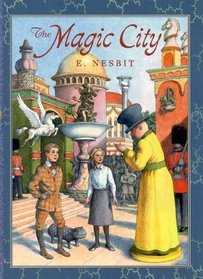Dare I say I have a new favorite-favorite Nesbit?! I loved, loved, LOVED The Magic City. I enjoyed The Enchanted Castle. I enjoyed it very much. But it doesn't come close to describing how I feel about The Magic City. I LOVE it so much!
Philip, the hero, has been raised by his much older sister, Helen. When she marries a widower with a daughter, Lucy, around his own age, he is upset. He just knows that he will HATE Lucy. (It almost seems like he'd feel too guilty to hate his uncle--Helen's husband. But hating Lucy, well, it almost feels necessary.) Philip goes to his new home, and, his attitude could use some improvement. But if there is one thing that he doesn't hate about his new home is the nursery full of toys. At first, he's not allowed to touch anything--not even one toy! The nurse doesn't have permission from Lucy to allow Philip to play with her things. But the nurse in a brief moment of kindness changes her mind. Philip is allowed to play, to imagine. And he does. He builds, I believe, two wonderful cities. He builds them from toys--not just blocks, but all sorts of toys. He builds them from books. He builds with things he finds around the house. These cities are a work of an artist--a creator. But days later--I believe it is days--the nurse returns in a very bad mood. (She'd been called away for personal family business.) She is very angry. She yells. She threatens. She assures him that the cities will be torn down the very next day. By this point, his attitude has calmed down quite a bit. Most of the staff--the servants--like him if not love him now. In the middle of the night, he goes to see what his cities look like in the moonlight...and that decision changes everything. It is the beginning of the proper adventures!
I loved this one. I loved spending time with Philip and Lucy. I love how their relationship changes throughout the book. I loved meeting all the characters, or almost all the characters! I loved seeing the residents of the city. Particularly Mr. Noah and his son. The book is super-fun and just a joy to read. I loved the premise of this one too.
Philip drew a deep breath of satisfaction, went straight up to the nursery, took out all the toys, and examined every single one of them. It took him all the afternoon. The next day he looked at all the things again and longed to make something with them. He was accustomed to the joy that comes of making things. He and Helen had built many a city for the dream island out of his own two boxes of bricks and certain other things in the house — her Japanese cabinet, the dominoes and chessmen, cardboard boxes, books, the lids of kettles and teapots. But they had never had enough bricks. Lucy had enough bricks for anything. He began to build a city on the nursery table. But to build with bricks alone is poor work when you have been used to building with all sorts of other things. ‘It looks like a factory,’ said Philip discontentedly. He swept the building down and replaced the bricks in their different boxes. ‘There must be something downstairs that would come in useful,’ he told himself, ‘and she did say, “Take what you like.”’ By armfuls, two and three at a time, he carried down the boxes of bricks and the boxes of blocks, the draughts, the chessmen, and the box of dominoes. He took them into the long drawing-room where the crystal chandeliers were, and the chairs covered in brown holland — and the many long, light windows, and the cabinets and tables covered with the most interesting things. He cleared a big writing-table of such useless and unimportant objects as blotting-pad, silver inkstand, and red-backed books, and there was a clear space for his city.
And the city grew, till it covered the table. Philip, unwearied, set about to make another city on another table. This had for chief feature a great water-tower, with a fountain round its base; and now he stopped at nothing. He unhooked the crystal drops from the great chandeliers to make his fountains. This city was grander than the first. It had a grand tower made of a waste-paper basket and an astrologer’s tower that was a photograph-enlarging machine. The cities were really very beautiful. I wish I could describe them thoroughly to you. But it would take pages and pages. Besides all the things I have told of alone there were towers and turrets and grand staircases, pagodas and pavilions, canals made bright and water-like by strips of silver paper, and a lake with a boat on it. Philip put into his buildings all the things out of the doll’s house that seemed suitable. The wooden things-to-eat and dishes. The leaden tea-cups and goblets. He peopled the place with dominoes and pawns. The handsome chessmen were used for minarets. He made forts and garrisoned them with lead soldiers. He worked hard and he worked cleverly, and as the cities grew in beauty and interestingness he loved them more and more. He was happy now. There was no time to be unhappy in.
© 2014 Becky Laney of Becky's Book Reviews


2 comments:
This looks so good! Definitely going on the TBR pile.
So glad to hear someone else loving this. I adored it as a child, but many people seem to think of it as one of Nesbit's minor works.
Post a Comment